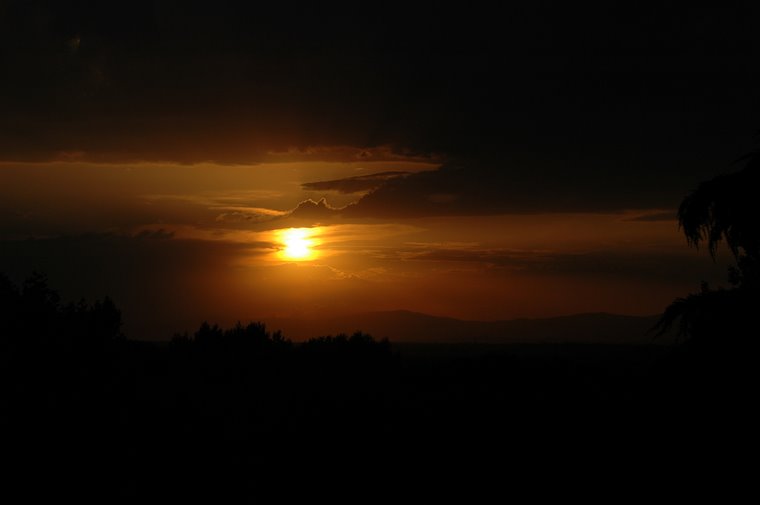A short story by Luke Helm
The calm darkness of the Mediterranean descended on
I carried her backpack, and we walked the cobblestone streets that had been quaint when we first arrived. Now, they seemed to give an impression of home. We passed a smiling little man, sitting in a rickety wooden chair outside his trattoria. He motioned for us to come closer, and then, in colored English—“De best Etalian vine, you buy, for her.” She smiled and lightly set her hand on his arm. In the best performance of his life, he drew his hand to his forehead, threw his head back and used the wall to steady himself. Turning to me, he whispered loudly, “For her…anything!” We laughed, and he disappeared through the narrow door and emerged carrying a bottle of white wine and a rose. Only fifteen Euros for “vino migliore in Italia!”—and the rose was a gift to the “Bella Donna.” His eyes widened as she, in graceful Italian, thanked him but explained that she had to catch the final train to
The email from my mother had humored me when I first read it—I’d been in
The infamous Annie, the elusive gem, the oldest daughter of my parents’ friends from Cornell, would also be touring the
In my last year of high school, my mother told me she’d seen a picture of Annie—beautiful, apparently. A few years later, I uncovered a college plot between the four friends to have their children marry. When I got her email, I scoffed. A convenient email address link hung at the bottom of the page. I knew Mom didn’t know how to do that.
I deleted the email and left the café, laughing to myself. The next train out of
“Ciao, Hostel of the Sun—English o Italiano, por favore?”
The convincing Italian from a distinctly American voice stopped me.
“Uh,” I closed my eyes to gather my thought. “Umm…English. Sorry”
“Sure, what can I do for you?”
The voice seemed eager to help, but the slight Bostonian edge paired with her smooth Italian baffled me.
“Um, yeah—I’m looking for a place in
“Yes, we do. Fresh bread and fresh fruit, every morning.”
“Ok, do you have internet access?”
“Well…yes. It was in and out last week—mostly out. But we’re feeling positive about it this week.”
I laughed and asked if they had an open room for the week. They had open dorm beds through the weekend, and after that, an open single room until the weekend. I took it and hopped a trolley to the Hostel of the Sun.
When I arrived, I met Annie for the first time. Her job as the receptionist hostel ended, along with the summer season, three days after I arrived, and we spent the next three weeks together, venturing through all places she still wanted to see, and the sites I had to visit for work.
We sat on the white stone steps of the train station, reeling from her imminent departure. I took out the bottle of wine; the homemade label had already begun to peel. She opened it with the red, white, and green bottle opener she bought for her sister from the bike vendor outside
The foghorn of the train signaled its customary, three minute early arrival. We stared silently at the spinning red petals of the rose, as she rolled the stem with her fingertips.
“I won’t be back in the States until October,” she said slowly, “And even then, I’ll be stuck in
“Aww,” I pleaded innocently, “but
Standing high overhead, the tiles of blue arrivals and green departures purred as they slowed and clicked into place. The puddles on the platform shook under the weight of the train; the neon greens and blues danced across the remnants of earlier rainstorms. The train bounded into the station, and the horn blared, deafening from twenty yards away. I gripped the large pack to hand to her. She looked down at the bag, then back up to me, her face strained—the first time I’d seen her look uncomfortable.
“What is it?” I asked, unfamiliar with her expression.
“I’m sorry”—she stared at me—“I couldn’t tell you everything here.”
The doors to the train opened; a handful of Italian men and tourists disappeared past us.
My face flooded with color and confusion. I managed only—“What couldn’t you tell me?”
“I’m sorry, darling; I know it doesn’t make any sense. I’m sorry, but you have to trust me.”
The conductor hollered, “All aboard!” My head snapped around to see that we were the only two still on the platform. She held out her hand for the bag, and my arm obeyed, but only with all the discipline it amassed over a lifetime. She slung the pack over her shoulder and grabbed my hand, and we walked toward the open doors.
“Wait,” I scrambled, “trust you about what?” My mind raced to understand. “I’ll call you sometime Thursday—once you get to the hotel with your Dad. I’ll talk to you then.” My statement was more of a plea.
She looked sadly into my eyes, and shook her head in an apologetic “no” as a few tears started down her face. The conductor hollered his final call; she turned and stood tall, awkward under the weight of the bag, straining to kiss my cheek. I lowered to her, feeling her wet cheek. And then she squeezed my hand, and stepped backward onto the train. Her gaze steadied as the horn blew again.
Her face looked of nothing but resolve—“I’ll find you. I love you. Trust me.”
The doors slid shut with their mechanical conviction; I watched her retreat to the handrail and set her pack down. And with that, the train exhaled deeply and slid, slowly at first, into a world without me. She was gone, gone before I could think to jump on the train with her, gone before I could think anything. The train sped her off, along the sea and then toward
I drifted back down the white stone steps and stopped to sit next to the broken mug. She had told me she had to leave on the 13th, but we didn’t talk of it again until that night. She’d packed her belongings into her enormous backpack and emerged from the girls’ wing of the hostel in
Going with her was never mentioned—she never gave me the option. She had given me her email address and her cell-phone number from the States and the hotel number where she was meeting her Dad. I reeled from our last few moments. I had work to finish in
▼



No comments:
Post a Comment